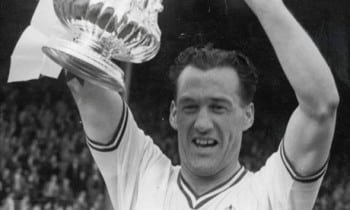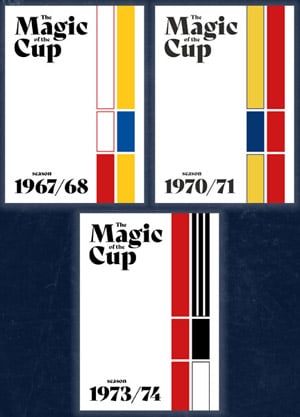And so another link with the game of the past slips away, the game that so beguiled the nation generations ago and so begat the game we have today, built as it is on the national obsession with football. Even in death, Nathaniel Lofthouse – now THAT’S a proper name for a footballer – remains one of those legendary giants of the past upon whom we have constructed the present and the future. So big, broad and strong was Nat Lofthouse that you could have literally built on him, for the colossus that was the “Lion of Vienna” possessed the mighty arms – and thighs – of Atlas.


By Dave Bowler
When people talk of the old fashioned English centre-forward, you can bet that Lofthouse is the archetype who exists in their mind’s eye. Muscular, powerful, magnificent in the air, explosive on the floor, hungry to the point of ravenous whenever he was in pursuit of the ball, he was the kind of player that stepped off the terraces and onto the pitch, out of the pages of “Roy of the Rovers” or “Scorcher” and into reality.
Like so many of his generation, Lofthouse lost many of his years in the game to World War Two. He joined his local club, Bolton Wanderers, on 4th September 1939, just 24 hours after war had broken out, perhaps the poorest piece of timing he ever displayed in his footballing career. As a consequence of Hitler’s open invitation to mass slaughter and carnage, Nat did not make his senior debut until 1946 when he was already 21.
Bevin Boys
The war shaped him, as it did so many of his generation, but it was perhaps more formative for Lofthouse than for many because he spent his war in England, but in perilous national service all the same, down the mine as one of the legion of “Bevin Boys” who helped slake the never ending thirst for more and more energy to fuel the war effort. He caught a tram at half past three every morning to head off for an eight hour shift in the bowels of the earth. Little wonder that playing football later on came as such a joy.
When football finally emerged again, blinking into the light of peace after the war was over, with devastating irony tragedy was to strike Bolton fans celebrating the return of normality. Bolton’s Burnden Park was the site of one of the greatest disasters in English football history when 33 Bolton fans were killed and hundreds more injured in a crush at an FA Cup tie with Stoke in March 1946 when an estimated crowd of 85,000 was simply too huge for the ground to cope with.
Burden
The burden upon the Bolton players thereafter was immense as they tried to give the community something to hold onto in the wake of such catastrophe. Only 21, Lofthouse quickly became the rallying point, the fulcrum of the new Bolton side that resumed Football League duties in August 1946.
Lofthouse was a genuine working class hero, collecting £10 as a signing on fee from the club, reflecting that it was four times the weekly wage his father earned for slogging his guts out as a coal bagger. Lofthouse’s humility was an endearing quality that never left him, a trait that was in complete contrast to the robust, ferocious style he displayed on the park.
England
A regular goalscorer for the Trotters, it took him until 1950 to force his way into the England team, although in the days before a dozen substitutes a game these were the days when England caps had to be merited – they didn’t come free with corn flakes. His debut came in November 1950 at Highbury, scoring both goals as England drew 2-2 with Yugoslavia but his defining moment was to come some eighteen months later.
When England travelled to take on Austria in the Ernst Happel Stadion in June 1952, the Austrians were seen as a world footballing power, a real test for England. The visitors triumphed 3-2, Lofthouse scoring twice, the second coming despite the most rudimentary attempts to stop him, the big man elbowed in the face and ultimately knocked out in the act of scoring that winner, leaving the field briefly before returning to see England to victory, his example inspiring the rest of his colleagues to hold on to victory. The legend of the “Lion of Vienna” was born.
FA Cup
His club team mates were unable to do likewise a year later when in spite of an early goal from Lofthouse seeing them to a 3-1 lead, Wanderers were unable to hold back the tide of another of the true legends of the game, Stanley Matthews inspiring the greatest FA Cup Final comeback of them all as Blackpool won 4-3 to give Matthews his only cup winner’s medal. Lofthouse would not be denied though and in 1958, he was back at Wembley, leading Bolton into battle against what was left of the shattered Busby Babes who had somehow staggered to Wembley after the destruction of Munich less than three months before.
Skipper Lofthouse and Doug Holden were the sole remnants of the 1953 team, looking to avenge that defeat in a cup final the whole nation beyond Bolton wanted them to lose. There was to be no salvation for United, Lofthouse opening the scoring after three minutes, then settling the game after 50, shoulder charging Harry Gregg and the ball into the net, a controversial, but wholly legitimate tactic at the time.
Had it been almost any other player in the land who had beaten United and bloodied Gregg, they would have been reviled forever more, such was the febrile atmosphere after Munich and the desperation to see United ease their pain with a trophy. But Lofthouse was forgiven not least because, approaching 33, people wanted to see him get his hands on a medal at last and emulate Matthews. To be held in the same esteem and with the same sentiment as Stanley Matthews was a measure of the man.
Retirement
Time and injury caught up with him in January 1960, retiring after scoring 255 goals in 452 league games for just one club. Twelve months after his retirement, the maximum wage was abolished, ushering in an era where very quickly the £20 a week he received at his peak looked the pittance it was. Lofthouse never received the financial reward he was due, but the regard, the love of the people was no small compensation. The outpouring of grief and the scale and sincerity of the tributes for the passing of this 85 year old still do no more than scratch the surface of his contribution to English football and to Bolton Wanderers.
A working class hero he became, in an era when the war had taught us what being a hero really meant. We shall not see the like of him again.
Dave Bowler is the author of ‘The Magic of the Cup‘ series of books exploring the great FA Cup teams of years gone by – WBA 68, Arsenal 71, and Liverpool 74.
See them here and order yours in time for the holidays!
Follow the magic of the cup on Twitter: @MagicOfFACup
